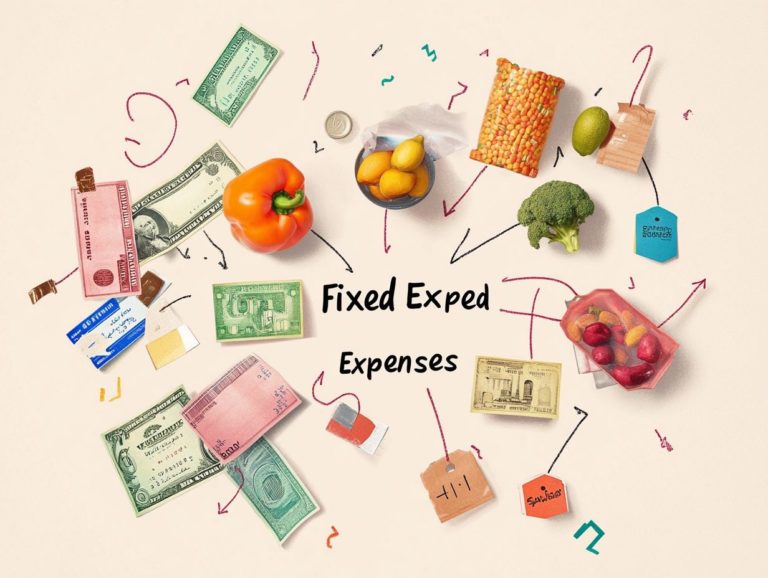How to Secure Consistent Cash Flow as a Freelancer
Contents
- Key Takeaways:
- The Importance of Consistent Cash Flow for Freelancers
- Common Challenges for Freelancers
- Strategies for Securing Consistent Cash Flow
- Tools and Resources for Managing Cash Flow
- Tips for Maintaining Consistent Cash Flow
- Frequently Asked Questions
- How can I ensure a steady stream of income as a freelancer?
- Is it important to have a diverse client base as a freelancer?
- How can I set competitive rates without scaring away potential clients?
- What are the benefits of setting up a retainer agreement with clients?
- How can I avoid late payments from clients?
- What should I do if I experience a sudden decrease in clients or income?
Key Takeaways:
- Diversify your income streams to avoid relying on a single source of income as a freelancer.
- Set realistic rates and payment terms to ensure a steady flow of income and avoid financial instability.
- Building strong relationships with clients can lead to repeat business and consistent cash flow.
The Importance of Consistent Cash Flow for Freelancers
Managing cash flow is crucial for freelancers. It ensures long-term success and financial health.
Unlike traditional employees, freelancers do not receive a steady paycheck and often face irregular payments from clients. Therefore, they need to establish effective methods for tracking their income and expenses.
Two key strategies freelancers can employ to navigate financial challenges and maintain a steady cash flow are budgeting and understanding their payment structures.
This economic stability benefits both freelancers and their clients, fostering better relationships and enhancing service delivery.
Common Challenges for Freelancers
Freelancers encounter several common challenges that can impede their success, particularly irregular income and financial instability.
Unlike traditional employees who receive regular salaries, freelancers must navigate unpredictable client payments and the complexities of financial management.
Irregular Income and Financial Instability
The irregular income that freelancers experience often leads to significant financial instability. This makes cash flow management essential for them.
Without a steady paycheck, freelancers may struggle to meet their basic needs and maintain a stable financial situation. The unpredictability of income can make budgeting a real challenge!
An effective strategy to address this issue is income forecasting. This involves estimating future earnings based on past performance and current market conditions.
Establishing an emergency fund helps freelancers manage unexpected income drops. This allows them to navigate periods of lower earnings without falling into debt. By practicing good financial management, freelancers can develop a more stable income pattern.
Ultimately, this enhances their mental and emotional well-being and ensures sustainability in their careers.
Difficulty Managing Expenses
The biggest challenge freelancers face is managing their expenses, which can fluctuate significantly from month to month.
Tracking and budgeting for these expenses can be difficult, as freelancers must closely monitor their spending to maintain financial stability despite their inconsistent income.
To effectively navigate these financial ups and downs, freelancers need to employ multiple strategies that promote healthy financial management.
Strategies for Securing Consistent Cash Flow
Consistent cash flow is essential for freelancers to succeed in their business. Implementing effective strategies can make a significant difference.
Diversifying income streams, negotiating favorable payment terms, and requesting upfront payments are just a few strategies that can help freelancers achieve a more stable cash flow.
Diversifying Your Income Streams
For freelancers, diversifying income streams is essential for achieving financial stability and reducing reliance on a single source of income.
By exploring various freelance opportunities, individuals can mitigate the risks associated with irregular pay and uncertain client payments. This strategy not only enhances financial security but also opens up opportunities for new projects and collaborations.
Freelancers can benefit from taking on multiple clients simultaneously. This allows them to balance workloads and maintain a steady cash flow.
By leveraging a variety of skills—such as graphic design, writing, or digital marketing—they can attract a broader range of clients and expand their service offerings.
Additionally, exploring passive income options, such as creating online courses or selling digital products, can significantly enhance their financial situation and establish a foundation for long-term sustainability.
Act now to secure your financial future as a freelancer!
Setting Realistic Rates and Payment Terms
Setting realistic rates and clear payment terms is vital for freelancers to ensure consistent cash flow and maintain strong relationships with clients. Understanding the average price for their services helps freelancers negotiate rates that meet their financial needs while remaining fair and competitive.
Freelancers can conduct market research and competitor analysis to find out what others in their field charge for similar services. This information aids in negotiating rates and allows freelancers to explain their pricing effectively to clients.
Incorporating flexible payment structures, such as milestone payments or ongoing payment agreements, enhances client satisfaction and trust. Open communication is key during negotiations, allowing freelancers to address questions and concerns. This ultimately leads to a smoother negotiation experience.
Building Strong Relationships with Clients
Strong client relationships are essential for freelancers looking to improve cash flow and work stability. Positive relationships can lead to repeat business, referrals, and even better payment terms, all of which significantly impact financial success.
Trust and open communication are critical for nurturing these relationships. By regularly seeking feedback, freelancers can promptly address any issues and show they value client input. This approach fosters loyalty and enhances a freelancer’s professional reputation.
Maintaining a professional demeanor ensures clients feel respected and well cared for. Providing exceptional service and proactively addressing problems establishes freelancers as reliable partners.
These efforts contribute to creating a stable income stream, essential for achieving long-term success in freelancing.
Tools and Resources for Managing Cash Flow
Freelancers should use various tools and resources to manage cash flow effectively. This will help keep finances in check. Options include accounting software, expense tracking systems, and invoicing platforms, which assist freelancers in maintaining accurate financial records and ensuring timely client payments.
Accounting Software and Budgeting Tools
Accounting software and budgeting tools are essential for freelancers, enabling effective cash flow management and overall financial stability by tracking income and expenses. Automating routine tasks, like invoicing and payment tracking, reduces error risk and saves valuable time.
Applications like QuickBooks, FreshBooks, and Mint provide user-friendly platforms with functionalities from detailed financial reporting to budgeting forecasts. Features such as expense categorization and real-time analytics empower users to make informed financial decisions.
Utilizing this software enhances efficiency and fosters a clearer understanding of one’s financial situation, leading to more confident cash flow management.
Freelance Platforms and Job Boards
Freelance platforms and job boards are critical for freelancers seeking regular work to improve cash flow. These platforms connect freelancers with potential clients, facilitating service delivery and opening doors to recurring projects. This not only simplifies the hiring process for businesses but also enables freelancers to promote themselves and build a diverse portfolio.
Many platforms offer features like rating systems, secure payment methods, and project management tools that streamline interactions. By effectively utilizing these resources, freelancers can access various job opportunities across industries, helping them establish a steady income stream.
This competitive environment encourages continuous improvement, urging freelancers to enhance their offerings to meet client needs.
Act now to explore these tools and resources for better financial control!
Tips for Maintaining Consistent Cash Flow
Freelancers often face challenges with consistent cash flow. Here are several tips to improve your financial situation.
Effective communication, establishing an emergency fund, and adhering to sound financial practices are essential strategies for safeguarding against financial difficulties.
Effective Communication and Negotiation
Communication and negotiation are crucial skills for freelancers. They help ensure steady cash flow and foster positive working relationships with clients. Open communication about client payments is vital for achieving these objectives.
Projecting a professional demeanor when discussing payment terms is key. Freelancers should communicate what they bring to the table and the value of their services. Being transparent about project milestones and timelines minimizes misunderstandings and aligns client and freelancer expectations regarding progress and work quality.
Using a professional tone and a collaborative relationship style during payment discussions builds trust. Following up verbal agreements with a written document outlining payment structures and performance benchmarks reinforces commitment from both parties and serves as a reference to help prevent future disputes.
Setting Aside Emergency Funds
Freelancers must set aside emergency funds to secure their financial future. This practice protects their financial health and provides a buffer against unexpected issues.
Creating a dedicated savings account solely for emergencies helps freelancers build their fund over time. Utilizing strategies like the 50/30/20 rule allows freelancers to allocate portions of their income for essential expenses, discretionary spending, and savings.
Automatic transfers to this account ensure that savings remain a priority, even when motivation wanes. Having an emergency fund reduces stress and uncertainty during challenging times, enabling freelancers to pursue new opportunities without fear of financial instability.
Frequently Asked Questions
How can I ensure a steady stream of income as a freelancer?
As a freelancer, maintaining a consistent cash flow can be challenging. One effective way is to establish long-term contracts with clients, providing predictable work and a regular income source.
Is it important to have a diverse client base as a freelancer?
Yes, a diverse client base is crucial for securing consistent cash flow. Relying on one or two clients can be risky, as their needs may change or they might no longer require your services. Multiple clients help mitigate this risk and ensure steady income.
How can I set competitive rates without scaring away potential clients?
Pricing can be delicate for freelancers. Researching market rates for your services is essential. Offering package deals or discounts for long-term clients can make your rates more appealing.
What are the benefits of setting up a retainer agreement with clients?
A retainer agreement secures consistent cash flow. This agreement involves a client paying a fixed fee each month for a set number of hours or services, providing stability for both parties even during slower months.
How can I avoid late payments from clients?
Late payments are a common issue for freelancers. To avoid this, it’s important to have a solid contract outlining payment terms and consequences for late payments. Offering incentives for early or on-time payments, like a small discount, can also help.
What should I do if I experience a sudden decrease in clients or income?
Experiencing periods of slow business is not uncommon for freelancers. It’s important to have savings to fall back on and a plan to acquire new clients. Use this time to update your skills or network with potential clients for future work.










